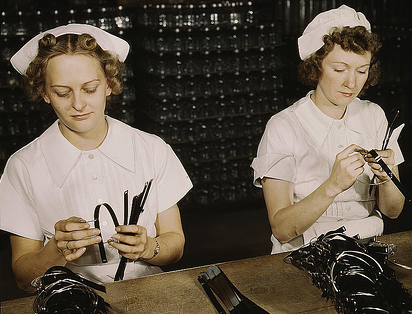Facebook: There Will Be Blood
Can Facebook, the popular social networking site, solve America's blood shortages?
Takes All Types, a group billing itself as the first bottom-up blood donor experiment, is tapping social networks to find out. The group's Facebook application explains:
The mission is to improve communities' local blood supplies by amassing a network of blood donors across the United States and then we send personalized alerts targeted by geography and blood type when our users are needed to donate.

TechCrunch's Michael Arrington offers more context:
About 43,000 pints of blood are donated each day... Total donations aren't adequate to satisfy demand, though, and shortages occur regularly. When a patient is in need of blood that isn't available, it becomes a life and death situation. Historically the Red Cross will make efforts to alert the public during a shortage. But there may be a better way - leverage the social networks to get the word out. If shortages of a certain type of blood occur in a certain zip code, having a database of willing donors in that zip code to contact may be the most efficient way to solve the problem quickly.
Ari Melber
March 10, 2008
Can Facebook, the popular social networking site, solve America’s blood shortages?
Takes All Types, a group billing itself as the first bottom-up blood donor experiment, is tapping social networks to find out. The group’s Facebook application explains:
The mission is to improve communities’ local blood supplies by amassing a network of blood donors across the United States and then we send personalized alerts targeted by geography and blood type when our users are needed to donate.
TechCrunch’s Michael Arrington offers more context:
About 43,000 pints of blood are donated each day… Total donations aren’t adequate to satisfy demand, though, and shortages occur regularly. When a patient is in need of blood that isn’t available, it becomes a life and death situation. Historically the Red Cross will make efforts to alert the public during a shortage. But there may be a better way – leverage the social networks to get the word out. If shortages of a certain type of blood occur in a certain zip code, having a database of willing donors in that zip code to contact may be the most efficient way to solve the problem quickly.
The group’s Facebook application just launched here; it currently has 19 "fans." Facebook, which has 65 million users, also ranked near the top of a new report listing which companies collect the most data on consumers. Accoring to comScore, a research firm, Facebook collects data on each user an average of 525 times per month. Yahoo collected data the most often, at 2,520 a month, followed by MySpace, AOL, Google and then Facebook.
As users upload private and medical information, of course, these companies have an even greater duty to protect privacy and proactively disclose how they collect, use and monetize that information.
—
Photo Credit from The Library of Congress: "Two Navy wives, Eva Herzberg and Elve Burnham, assemble bands for blood transfusion bottles at Baxter Laboratories in 1942."
Latest from the nation
-
Today 9:55 am
Netanyahu Is Destroying Trump’s Flimsy Peace PlansJeet Heer -
Today 8:30 am
Staining the Labels of HistoryFelipe Galindo -
Today 5:00 am
Why We Keep Reading “All Quiet on the Western Front”Paul Reitter -
December 26, 2025
The Story of the YearSteve Brodner -
December 26, 2025
A Movement-Building Strategy for All WorkersPeter Olney and David Bacon
Ari MelberTwitterAri Melber is The Nation's Net movement correspondent, covering politics, law, public policy and new media, and a regular contributor to the magazine's blog. He received a Bachelor of Arts in Political Science from the University of Michigan at Ann Arbor and a J.D. from Cornell Law School, where he was an editor of the Cornell Journal of Law and Public Policy. Contact Ari: on Facebook, on Twitter, and at amelber@hotmail.com. Melber is also an attorney, a columnist for Politico and a contributing editor at techPresident, a nonpartisan website covering technology’s impact on democracy. During the 2008 general election, he traveled with the Obama Campaign on special assignment for The Washington Independent. He previously served as a Legislative Aide in the US Senate and as a national staff member of the 2004 John Kerry Presidential Campaign. As a commentator on public affairs, Melber frequently speaks on national television and radio, including including appearances on NBC, CNBC, CNN, CNN Headline News, C-SPAN, MSNBC, Bloomberg News, FOX News, and NPR, on programs such as “The Today Show,” “American Morning,” “Washington Journal,” “Power Lunch,” "The Last Word with Lawrence O'Donnell," "The Joy Behar Show," “The Dylan Ratigan Show,” and “The Daily Rundown,” among others. Melber has also been a featured speaker at Harvard, Oxford, Yale, Columbia, NYU, The Center for American Progress and many other institutions. He has contributed chapters or essays to the books “America Now,” (St. Martins, 2009), “At Issue: Affirmative Action,” (Cengage, 2009), and “MoveOn’s 50 Ways to Love Your Country,” (Inner Ocean Publishing, 2004). His reporting has been cited by a wide range of news organizations, academic journals and nonfiction books, including the The Washington Post, The New York Times, ABC News, NBC News, CNN, FOX News, National Review Online, The New England Journal of Medicine and Boston University Law Review. He is a member of the American Constitution Society, he serves on the advisory board of the Roosevelt Institute and lives in Manhattan.